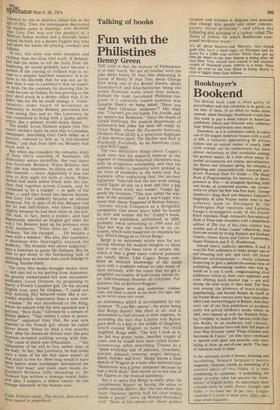Bookbuyer's
Bookend
The British book trade is often guilty of parochialism and this columnist is as guilty as the best of them. In an effort to make some amends, albeit fleetingly, Bookbuyer would like this week to pay a small tribute to American publishers Simon and Schuster who celebrate their fiftieth anniversary next month.
Essandess, as it is sometimes called, is today one of the largest American houses with a staff of 850, a turnover approaching 50
dollars and an annual output of nearly 1000 titles overall, yet its commitment has been almost exclusively to that unreliable animal._ the general reader. At a time when many illheeled accountants are urging specialisation, the Simon and Schuster spring list remains a beguiling and characteristically wayward pot-_ pourri. Practical 'How To' books — The Basic Book of Fingertveaving, for instance, or Back,, gammon to Win — sit alongside sporting titles' and books of crossword puzzles, the cornerstone on which the firm was first built. George Gershwin's Song Book and Maurice ZolotoVrsbiography of John Wayne nestle next to the authentic book on Watergate by the Washington Post reporters, and Ladislas Farago's investigative study of the Fourth Reich criminals. Hugh Johnson's International Book of 7`rees rubs shoulders with a paperback edition of The Joy of Sex (this column last month) and of Pablo Cassis' reflections. And there are novels by Irving Wallace and Graham Greene, Gwen Davis and Carlos Casteneda, Susan Howatch and P. G. Wodehouse.
Always heavy publicity spenders, S and S were the first publishers to make proper use of the amusing soft sell, and their old Inner Sanctum advertisements — chatty columns purporting to give a behind-the-scenes view of publishing, admonishing readers who had ignored an S and S work, congratulating rival publishers (often at their own expense) and even offering stock market tips — are still among the most lively of their kind. The firm was among the pioneers of mass-market paperbacking, and backed Robert de Graff in his Pocket Books venture some four years after Allen Lane started Penguin in Britain. And they were one of the first publishers to produce really low priced children's books when, in 1942, they teamed up with the Western Printing Company to launch the famous Little Golden Books. In an exuberant half century. Simon and Schuster have had their full share of what Max Schuster called "Flops d'Estime and Successes de Fiasco," yet they have continued to operate with spirit and panache, only once failing to show an end-of-year profit. The best of American luck to them.
In the uncertain world of literary lionising and squabbling, Howard Sergeant's .poetry magazine, Outposts, stands as something of a sentinel above all that fiddle. It is now celebrating its centenary 3f publishing. for better or worse, what has become the 'mainstream' of English poetry. Its anniversary issue contains work by Amis, Porter, Enright and Fuller — to name but 10 per cent. Congratulations to a pearl of small price (25p), and a large small magazine.


































 Previous page
Previous page